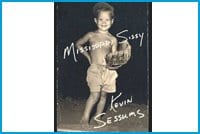Fourteen years at Vanity Fair, not to mention a stint with Andy Warhol’s Interview and an impressive record of freelance work, have shaped Kevin Sessums into a certain kind of wordsmith. This first book, a candid and brave memoir of his childhood and teen years in redneck Mississippi, owes a lot to the anecdotal rush of lifestyle journalism. But that’s okay — even if Sessums tortures Flannery O’Connor’s ghost with the news that her stories “curdle together into a kind of wisdom that sits like clabber atop the churned-up innocence of our lives.”
That’s on page three. By page four, we’ve witnessed two smashed human heads oozing “gelatinous” matter and “red thick yolks.” The first death was Kevin’s dad, killed in a car crash when Kevin was eight. The other was Mississippi arts journalist Frank Hains, bludgeoned with a crowbar in his own bed. Sessums himself, in 1975 at age 17, discovered that pulped head.
Though the overheated writing can make Sessums’ life seem like shock-and-shlock crime fiction, there’s finally a revelatory edge to this memoir that cuts through the excess. Sessums has a gift for reviving the unfettered sensuality of childhood, viewed always through the assessing eyes of the grownup who’s lost his innocence. The book is studded with expressive gems — like this image of two young moms basking on their tummies in the summer sun: “They carefully rubbed Coppertone lotion onto their smooth and lovely backs, their jutting shoulder blades like the nubs of dewinged angels grubbing around down here on earth.”
Little Kevin had a sashay of manner that proved inalterable, while his taste for girls went the other way. A neighbourhood tomboy lured him into the bushes one day for a game of butt-sniffing. Pondering little Kevin’s aroma, she says, “Hmmm… you don’t really stank. You sure you a boy?” Her brazenly displayed girl butt leaves Kevin gagging, while she brags about her raunchy boy-scent.
Sessums’ 1960s South is a strange world. While astronauts orbited in space sipping their Day-Glo Tang, the plantation fields remained filled with “coloureds” picking cotton by hand. Most of Kevin’s friends and relatives still casually used the N-word for African-Americans, as Kevin did until a black housekeeper gave him a pointed lesson in the pain it caused.
Sessums reports that he “grew up immeasurably” in 1968, following the assassinations of Martin Luther King and Robert Kennedy. The “fear and disgust” he felt at racist elation after the killings made him vow that some day he’d escape Mississippi for good.
Writer Eudora Welty was a powerful artistic and liberalizing influence on the teenage Kevin. Along with Frank Hains, she and Kevin were active members of Jackson, Mississippi’s New Stage Theatre. Later we’re taken to Welty’s bedside in the final days of her life, in the same home where she’d written her stories and novels. Sessums movingly evokes the decline of flesh while her spirit continues to live in the power of words. “Reverie was all that was left her.”
Sessums’ affection for Billy Graham, silver-haired daddy of TV evangelism, is explicit in the book. This fixation threw me for a loop. Not once does Sessums level a shred of criticism at Graham. (On gay marriage, Graham has simply affirmed his God-is-love stance while saying he steers clear of such “hot button issues” — his term for rights he’s not willing to support.) After enduring the level of homophobic brutality recorded in this book, it seems astounding that Sessums refuses to challenge his revered preacher.
Shortly after his childhood conversion experience during a televised Graham crusade, Kevin, at a horny age 11, allowed a stranger to fondle him in a movie theatre. The ambivalent pleasure he found in his own growing erection led moments later to humiliation and physical violence in the theatre washroom — then Kevin’s solo orgasm after the man left. Bouncing between festering guilt and growing desire, Kevin later was seduced into pathetic sex with a fundamentalist preacher. “I ejaculated. Fear. Anger. Utter sadness.”
The result? An even firmer erotic fixation on the saviour, grandpa Billy himself. In later teenage reveries at home, Kevin banished tormenting memories by climaxing to visions of Graham’s “handsomer visage… his soothing North Carolinian accent,” as he called his flock to Jesus. “Come, come, come….”
The ghastly apex of his teen years was the discovery of his mentor Frank’s bloody body, then the murder trial that proved a field day for diehard homophobes.
As rivetting as this book is at times, as searing the honesty, there remains a distressing failure to grapple with the Christian intolerance that still hounds queer kids. I wish Sessums had subjected the Bible thumpers to the same unerring gaze he levelled at himself.

 Why you can trust Xtra
Why you can trust Xtra


